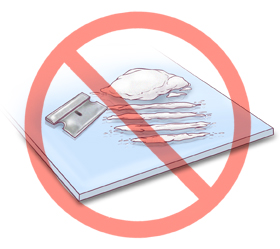Cocaine is typically snorted or injected into a vein. It can also be rubbed onto the gums. Crack is made from cocaine. It can be smoked for a stronger effect. Cocaine causes a very powerful mental and physical dependence.
Once you have a dependence, you'll do just about anything to get the drug and have the feeling it gives you. This can increase your risk for:
-
Overdose that may lead to death
-
Loss of your job, your home, or your family
-
Accidental injuries to yourself or others while you are under the influence of the drug (in a car or at home)
-
Arrest, conviction, and jail sentence for possession of an illegal substance or for driving under the influence
Medically, cocaine can affect every organ in your body. It can cause:
-
Chest pain, heart rhythm problem (arrhythmia), heart attack, and heart failure
-
Very high blood pressure
-
Severe headache, seizures, loss of consciousness, and stroke
-
Anxiety, psychosis, confusion, paranoia, and hallucinations
-
Nasal damage from snorting
-
Nausea, belly (abdominal) pain, and loss of appetite
-
Chronic bronchitis and shortness of breath from smoking
-
Higher risk for HIV infection, hepatitis B or C, and heart infection. This is from IV use, risky sexual behavior while high, or both.
-
Kidney failure
Home care
These tips will help you care for yourself at home:
-
Admit you have a drug problem. Ask for help from your family and close friends.
-
See a mental health provider or counselor if you have depression or anxiety.
-
Join a self-help group for drug abuse.
-
Stay away from people who abuse drugs themselves or who tempt you to continue abusing the drug.
-
Eat a balanced diet and start a regular exercise program.
If you continue to use IV cocaine, lower your risk of getting or spreading infection by:
-
Using only sterile equipment
-
Not reusing or sharing equipment
-
Cleaning your skin before injecting
Follow-up care
Follow up with your healthcare provider, or as advised.
Contact 1 of the resources below for help:
Call 911
Call
-
Seizure
-
Hard time breathing or slow, irregular breathing
-
Chest pain
-
Sudden weakness on 1 side of your body or sudden trouble speaking
-
Very drowsy or trouble waking up
-
Fast heart rate
When to get medical advice
Call your healthcare provider right away if any of the following occur:
-
Agitation, anxiety, or unable to sleep
-
Unintended weight loss. This means more than 10 to 15 pounds over 6 months without dieting.
-
Hallucination, severe depression, or thoughts of harming yourself or another
-
Fever of 100.4°F (38ºC) or higher, or as advised by your provider
-
Redness, pain, or swelling at an injection site
-
Loss of vision or decreased vision


